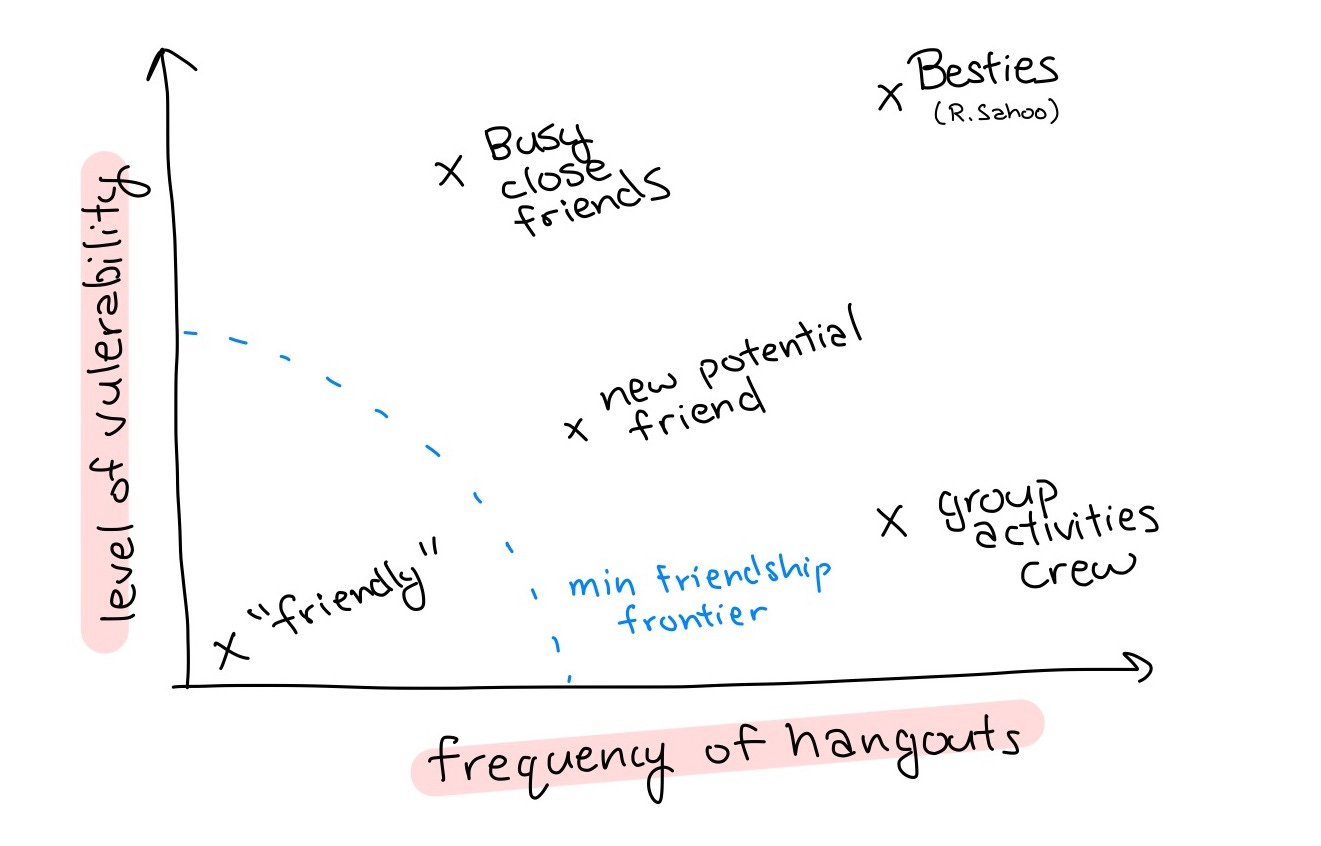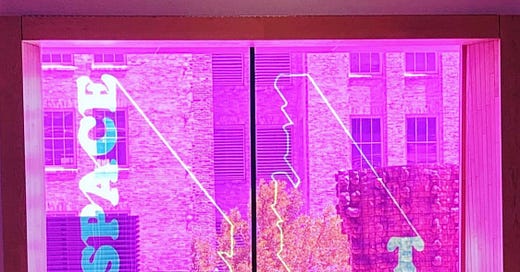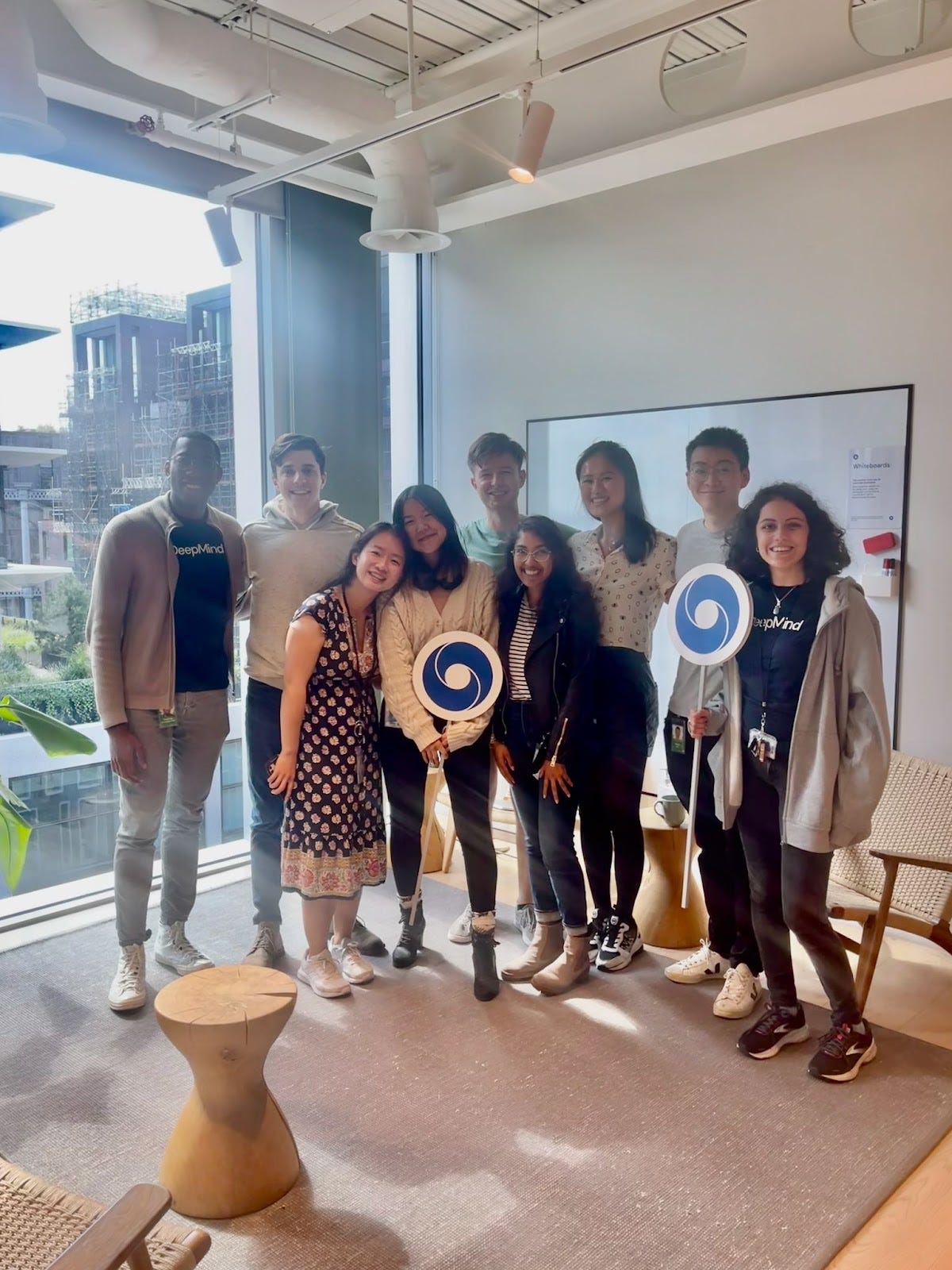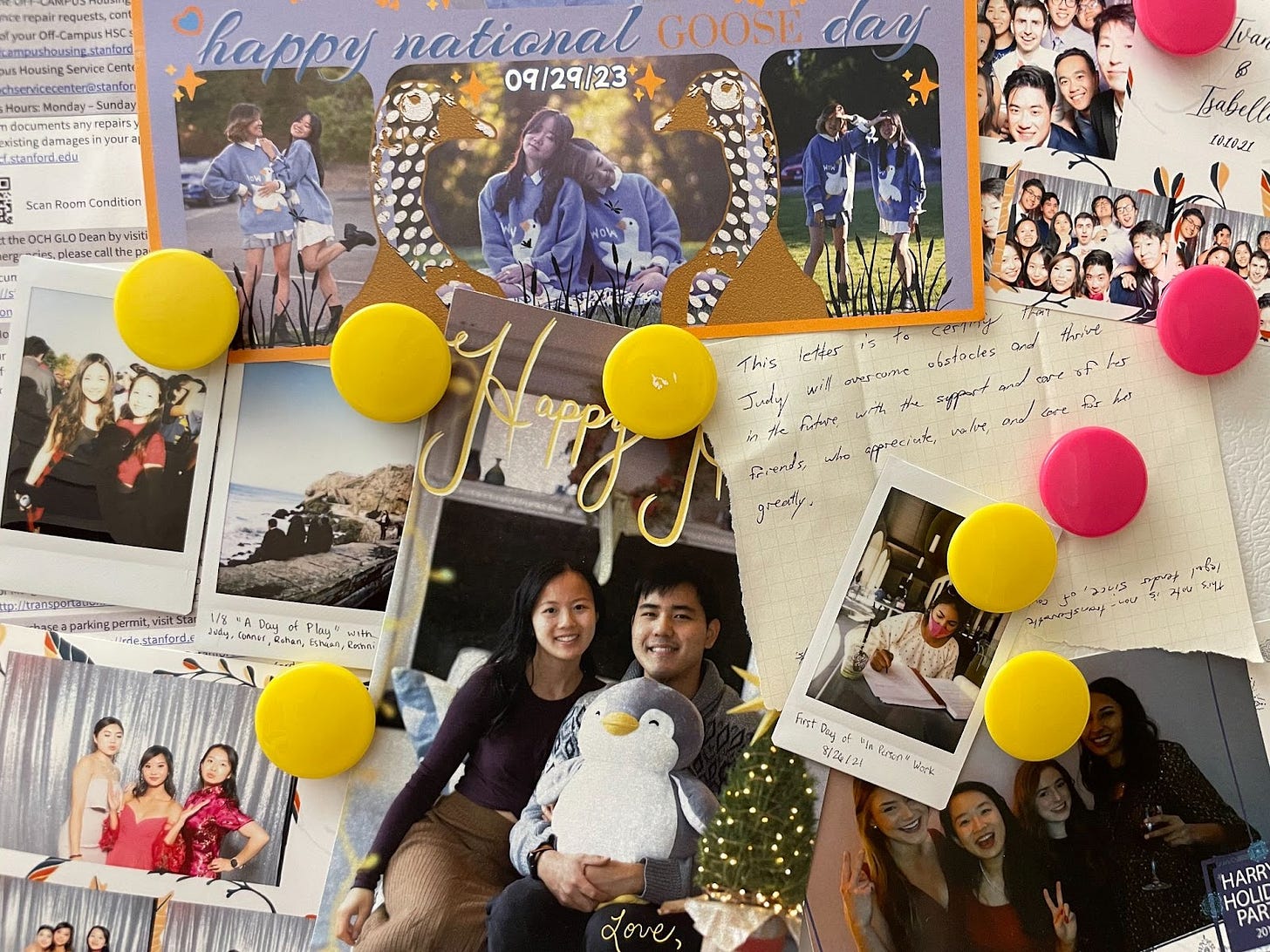The (life-changing) magic of grad school friendships
A warm and fuzzy take on importance of pursuing friendships
Since the first day of kindergarten, friendships have been an integral aspect of school. Graduate school is no exception— the opportunities for new friendships are plentiful in this era of your life. If kindergarten friendships are easy and magical, grad school friendships are still magical but not necessarily easy. Like any other relationship in adulthood, a friendship is a living thing that requires effort to nurture. As your friendships grow, graduate school shifts from a lonely, harrowing journey into one long, fun, hangout with the most awesome people. This blog post was written to convince you that close friendships in graduate school are not only attainable but worth pursuing.
Grad school is friendship-land 🦄
In grad school, we are uniquely positioned to build great friendships. We are suddenly surrounded by other young, like-minded people whom we both resonate with and are inspired by. At many schools, we also live within a 20-minute walk, ride, or a 5-minute drive of most of our friends. Social and spatial proximity are “strong and persuasive” factors in the development of adult friendships1. This proximity allows spontaneous adventures to materialize and encourages strong friendships to flourish.
Grad school also provides consistency: another key factor for friendships to grow. In the working world, the people around us might switch jobs or move cities; activity-based friendships can suddenly fade without anyone being at fault. In contrast, Ph.D.s can range from 3 - 7 years, providing a sizable chunk of time to invest in stable friendships that will last through different seasons of life. Not all of us have a strong sense of identity at matriculation; our personalities are in flux – we grow more comfortable with ourselves as our worlds expand post-undergrad. Fortunately, the sheer duration of most Ph.D. programs gives us space to examine who we are and intentionally grow toward who we want to become alongside our friends. For those of us in our 20s, growing amid our defining decade alongside a stable group of friends is a luxury that a lot of young adults in the working world might not have2.
Having shared priorities is a third factor that makes grad school a great environment to make friends. While everyone in grad school might prioritize their time differently, most students share ambitions to work on something they believe in, perhaps at the cost of financial freedom and being close to home. In contrast, old friends from high school and college may prioritize other life achievements such as buying a house or putting down roots. Building relationships with people who similarly value and devote energy to their professional passions can be a strong foundation for friendship.
If you have tried to make friends in a new city as an adult, you know that it can feel painfully difficult. Even if you manage to make friends, they might move to different cities and enter new phases of their lives that change your friendship drastically. In contrast, grad school provides a group of peers, in close proximity, with similar priorities who are committed to being in the same place for half a decade. In many ways, it is truly the opportune moment to build friendships.
We’re all… in this… together: the power of mutual support🚶♀️
For some, grad school will be all sunshine and rainbows. But for the rest of us, many of the most discouraging moments we have ever experienced thus far will happen to us in grad school. But every single one of these tough challenges we encounter can become easier with the support of our friends. Some of our challenges are indeed common to other young adults, like recovering from a devastating breakup or developing a chronic illness. But other challenges like questioning whether this “research” thing we spend most of our waking hours pursuing is impactful while resubmitting a paper for the 3rd time are uniquely shared by (some of) our grad school peers.
For those of us who are minorities in our research environment, curating a circle of friendship where we can candidly share experiences is absolutely crucial for survival. It is comforting to find that there is a community with the same struggles as you even if your community is in the minority. For example, the self-doubt that I often feel as a consequence of being in environments with overconfident people becomes less burdensome when I can process these feelings with friends who empathize deeply with me. Friends with shared identities are the basis for communities of mutual support and information dissemination. Another example is that the confusing maze that accompanies being an international student becomes much more manageable when my friends supply both encouragement and key knowledge.
Grad school friendships provide more than just help in difficult situations–they also make the daily grind so much more fun. Planning the next new workout class or restaurant to try with your friends after work fills each and every week with joy and anticipation. Simple activities like grocery shopping or chill work sessions at coffee shops shift mundane tasks to clownery when you are around your people.
For CS PhD’s in particular, our full-time tech friends seem to have beautiful lives filled with skiing in the winter and raves in the summer all while they appear to be sailing through big life milestones like getting married and buying a house (or two). But grad school life with your Ph.D. besties is also beautiful: You have support for the bad days and also exciting things to look forward to on the average days.
Fantastic friendships and where to find them 🔍
I feel deeply fortunate that some grad school friendships, like admit weekend roommates and COVID test-taking buddies, seem to have found me. The first two years of the Ph.D. are ripe with chance encounters to meet new friends through classes, activities, and parties; most people are fairly open to new friendships. By the third year, people start to drop like flies from the social scene but close friendships also form and stabilize. For me, close friends are people I consistently make an effort to hang out with, and I prioritize being there for these friends over work when my support is needed. Being ambitious about how we can support and show up for our friends is a type of ambition in itself3.
Outside of your department, there are also plenty of friends to be made at workshops/conferences and internships; free food turns into friendship dinner when eating together becomes a ritual. At your internship, it can start with asking each other how to order a monitor and then before you know it you are supporting one another through internship pressures or relationship drama. Outside of your field, plenty of friendships can be built with people who share your hobbies, convictions, and sense of adventure.
I am also very glad I have friends in my grad school era that I decided to intentionally pursue. Maybe someone offhandedly mentioned, “oh you should meet X”, and then out of excitement for a new friendship, I went out of my way to ask X to get coffee. Trying to “make friendship happen” can take a few repeated tries but making this effort empowers us to make active choices about who we want to bring into our lives. When trying to make new friends, we do have to be patient because finding new people who have the time and interest to grow in friendship with us can be difficult in grad school. But when you do find a friendship spark, it is really worth the effort. So even if friendships haven't found you yet, with a little effort, you can still be intentional in finding your friends.
Ph.D. (friendship) goals
At the end of my Ph.D., I just want to graduate with some new skills, some (marginal) scientific contributions, a job, and a great circle of friends. Strong friendships have created a space of acceptance and understanding, which has helped me through every rough patch in my graduate studies thus far. The union of all my friends knows every single struggle, triumph, and silly thought I have ever had. I hope this can be your experience as well. Your Ph.D. is truly a magical time to build deep and fulfilling friendships… I hope you make the most of it!
Acknowledgments:
Thanks to John Hewitt, Debs Raji, Roshni Sahoo, Sanjana Srivastava, Kai Xiao, and Rohan Yadav for the thoughtful comments and ideas throughout this writing process. Also thanks to my dear friends for… everything. Thanks for reading :)
Frequently Asked Questions:
What if I missed the window of making friends? I am a senior grad student with no friends, what do I do now?
Keep reaching out! Even in the later years of your PhD, there are plenty of common experiences and struggles such as finding a job and building a vision of your post-PhD future that a lot of people around might also be thinking about. These commonalities create a great foundation for building friendships. There are also always opportunities to get into new hobbies where you’ll meet awesome new people in your wider school community.
Should I only focus my energy on grad school friends?
By no means! While I argue here for the wonderful support and community graduate school friends can bring, having friends with different pursuits is also super important. Your friends who are not in academia can help you realize that a lot of things you toil over do not matter at all in the grand scheme of your career and life. Some of them might also practice a level of work-life balance that we can all learn from.
How do I avoid comparing myself to my friends?
Generally, learning to not compare yourself to others during graduate school is hard. I argue that not comparing yourself to your friends, no matter how successful they are, should be easier than not comparing yourself to strangers. Channel your fondness of your friends into feelings of being proud when they accomplish their next big thing. A win for my friends is a win for all of us. If you are just the average of your 5 closest friends4, knowing that you have such awesome people as a part of your support network should instill confidence that you are awesome as well. Have the abundance mindset that all of you are already successful and will go on to do great things!
I feel like I am always initiating hangouts, how do I sustain friendships without feeling drained?
In every friendship, there will be seasons where one of you is reaching out more than the other. Instead of doing the accounting of how much give and take there is in a particular friendship, I like to make sure that across all my friendships, I feel balanced. Otherwise, feeling like you are taking on the emotional labor across all your friendships might be a sign to find more supportive friends. Being conscious of how much bandwidth people have to be your friend also helps; the person who can’t hang out with you because they have a deadline in 3 months might simply not have time for you in general.
What do you mean by friendship?
I have used the term “friend” very vaguely thus far. But having a close friend can mean very different things to different people. Someone you search for free food with, someone you mutually invite to parties, or someone you spill your deepest darkest secrets all fall in the broad category of “friend”. Figure 1 shows different types of friendships you can uncover. Notice that the axes are not labeled. Some people hang out with their besties many times a week while for others it is once a month.

Verbrugge LM. The structure of adult friendship choices. Social forces. 1977 Dec 1;56(2):576-97.
Jay, Meg. The defining decade: why your twenties matter--and how to make the most of them now. Twelve, 2012.
Stauffer, Rainesford We Should Be Ambitious About Our Friendships https://www.elle.com/culture/books/a44129583/we-should-be-ambitious-about-friendships/
According to motivational speaker Jim Rohn





